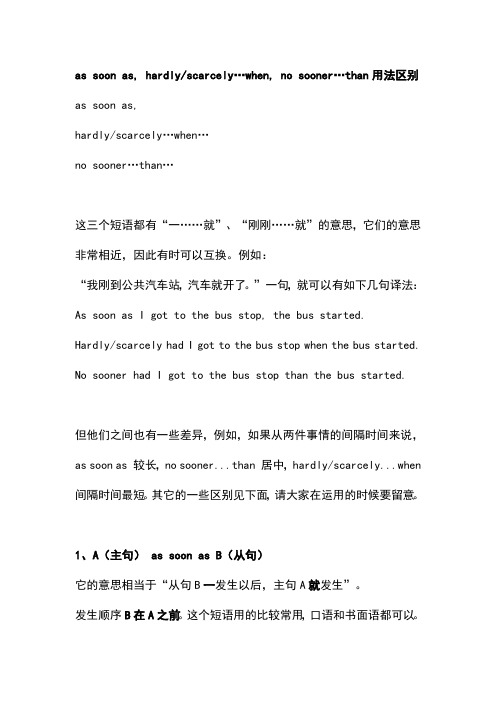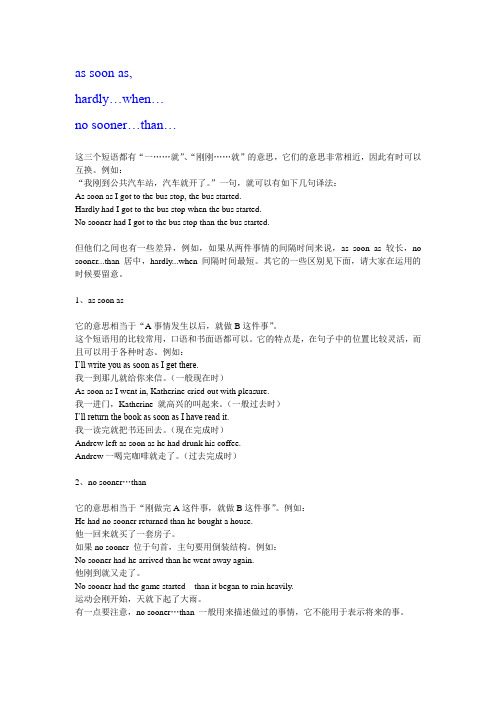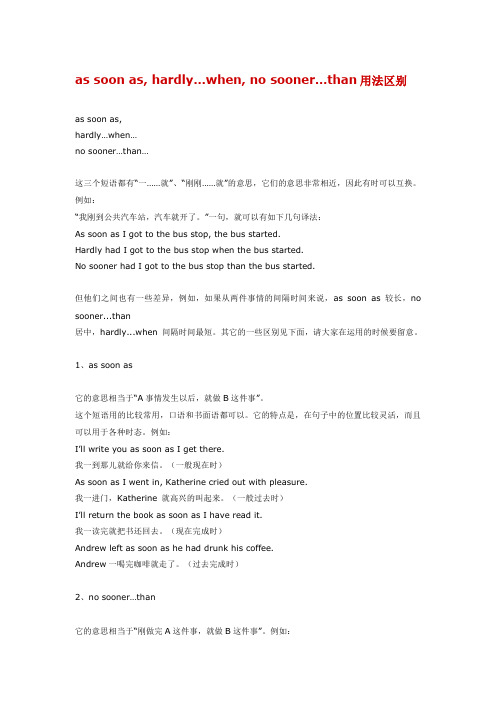no sooner.. than 和hardly.. when 的用法
- 格式:doc
- 大小:20.50 KB
- 文档页数:1

As soon as, no sooner…than, hardly…when , scarcely…when 的区别例:No sooner had I reached home than it began to rain.与这个短语类似的还有hardly ... when 意思为:"还没...就..." (主句用过去完成时,从句用一般过去时)例: We had hardly gotten there when it began to rain. 我们还没到那儿,天就下起雨了.Hardly...when...也常放在句首例: Hardly had we gotten there when it began to rain.no sooner than 和hardly when以及as soon as这三个短语都有“一……就”、“刚刚……就”的意思,它们的意思非常相近,因此有时可以互换.例如:“我刚到公共汽车站,汽车就开了.”一句,就可以有如下几句译法:As soon as I got to the bus stop, the bus started.Hardly had I got to the bus stop when the bus started.No sooner had I got to the bus stop than the bus started.但他们之间也有一些差异,例如,如果从两件事情的间隔时间来说,as soon as 较长,no sooner...than 居中,hardly...when 间隔时间最短.其它的一些区别见下面,请大家在运用的时候要留意.a、as soon as它的意思相当于“A事情发生以后,就做B这件事”。
这个短语用的比较常用,口语和书面语都可以.它的特点是,在句子中的位置比较灵活,而且可以用于各种时态.例如:I'll write you as soon as I get there.我一到那儿就给你来信.(一般现在时)As soon as I went in, Katherine cried out with pleasure.我一进门,Katherine 就高兴的叫起来.(一般过去时)I'll return the book as soon as I have read it.我一读完就把书还回去.(现在完成时)Andrew left as soon as he had drunk his coffee. Andrew一喝完咖啡就走了.(过去完成时)b、no sooner…than它的意思相当于“刚做完A这件事,就做B这件事”.例如:He had no sooner returned than he bought a house.他一回来就买了一套房子.如果no sooner 位于句首,主句要用倒装结构.例如:No sooner had he arrived than he went away again. 他刚到就又走了.No sooner had the game started than it began to rain heavily.运动会刚开始,天就下起了大雨.有一点要注意,no sooner…than 一般用来描述做过的事情,它不能用于表示将来的事.c、hardly…when...它的意思是“几乎未来得及做完A这件事,紧接着就开始B这件事.”使用这个短语时,一般用于过去完成时;并且when 有时可改用before.例如:He had hardly finished the article when the light went out.\x0d 他刚要写完文,灯就熄了.He had hardly had time to settle down when he sold the house.他还未安顿下来,就卖掉了那所房子.另外,如果把hardly放于句首,主句要用倒装结构即谓语动词要提前.如:Hardly had I finished eating when he came in.我刚吃完他就进来了.Hardly had she gone out when a student came to visit her.\x0d她还没走出家门,就有一个学生来看望她.Hardly和scarcely意思都是“几乎不”或者“刚刚”(表程度)。

No sooner than的用法和例句一、no sooner than的基本用法1. no sooner than是一个英语习惯用语,用来表示某事情发生的时间紧接在另一件事情之后。
在句子中通常用于连接两个动作或事件,表示第二个动作或事件发生的时间比第一个事件更早一些。
2. no sooner than通常用来表达“刚…就…”的意思,强调第一个动作还没有完成,第二个动作就接踵而至。
二、no sooner than的句式结构1. no sooner... than...的句式结构,其中no sooner位于句首,后接从句的倒装为than。
2. 句子中的主语和谓语根据具体情况而定,并且通常与no sooner后的动作相关联。
三、no sooner than的用法示例1. No sooner had I closed the door than it started to rain.(我刚关上门,雨就开始下了。
)2. No sooner did I arrive at the party than the host introduced me to everyone.(我刚到派对,主人就把我介绍给了所有人。
)3. No sooner had she finished one project than she started on the next.(她刚完成一个项目,又开始了下一个。
)四、no sooner than与hardly... when...的区别1. no sooner than和hardly... when...都表示“刚…就…”的含义。
2. 两者的句式结构略有不同,no sooner than后接动词短语,而hardly... when...后接主语和谓语的倒装结构。
3. 语境上,no sooner than侧重于时间上的紧接,而hardly... when...则侧重于动作发生的突然性。

as soon as, hardly/scarcely…when, no sooner…than用法区别as soon as,hardly/scarcely…when…no sooner…than…这三个短语都有“一……就”、“刚刚……就”的意思,它们的意思非常相近,因此有时可以互换。
例如:“我刚到公共汽车站,汽车就开了。
”一句,就可以有如下几句译法:As soon as I got to the bus stop, the bus started.Hardly/scarcely had I got to the bus stop when the bus started. No sooner had I got to the bus stop than the bus started.但他们之间也有一些差异,例如,如果从两件事情的间隔时间来说,as soon as 较长,no sooner...than 居中,hardly/scarcely...when 间隔时间最短。
其它的一些区别见下面,请大家在运用的时候要留意。
1、A(主句) as soon as B(从句)它的意思相当于“从句B一发生以后,主句A就发生”。
发生顺序B在A之前。
这个短语用的比较常用,口语和书面语都可以。
它的特点是,在句子中的位置比较灵活,而且可以用于各种时态。
例如:I’ll write you as soon as I get there.我一到那儿就给你来信。
(一般现在时)As soon as I went in, Katherine cried out with pleasure.我一进门,Katherine 就高兴的叫起来。
(一般过去时)I’ll return the book as soon as I have read it.我一读完就把书还回去。
(现在完成时)Andrew left as soon as he had drunk his coffee.Andrew一喝完咖啡就走了。

as soon as,hardly…when…no sooner…than…这三个短语都有“一……就”、“刚刚……就”的意思,它们的意思非常相近,因此有时可以互换。
例如:“我刚到公共汽车站,汽车就开了。
”一句,就可以有如下几句译法:As soon as I got to the bus stop, the bus started.Hardly had I got to the bus stop when the bus started.No sooner had I got to the bus stop than the bus started.但他们之间也有一些差异,例如,如果从两件事情的间隔时间来说,as soon as 较长,no sooner...than 居中,hardly...when 间隔时间最短。
其它的一些区别见下面,请大家在运用的时候要留意。
1、as soon as它的意思相当于“A事情发生以后,就做B这件事”。
这个短语用的比较常用,口语和书面语都可以。
它的特点是,在句子中的位置比较灵活,而且可以用于各种时态。
例如:I’ll write you as soon as I get there.我一到那儿就给你来信。
(一般现在时)As soon as I went in, Katherine cried out with pleasure.我一进门,Katherine 就高兴的叫起来。
(一般过去时)I’ll return the book as soon as I have read it.我一读完就把书还回去。
(现在完成时)Andrew left as soon as he had drunk his coffee.Andrew一喝完咖啡就走了。
(过去完成时)2、no sooner…than它的意思相当于“刚做完A这件事,就做B这件事”。
例如:He had no sooner returned than he bought a house.他一回来就买了一套房子。


as soon as, hardly…when, no sooner…than用法区别scarcely…whenas soon as,hardly…when…no sooner…than…这三个短语都有“一……就”、“刚刚……就”的意思,它们的意思非常相近,因此有时可以互换。
例如:“我刚到公共汽车站,汽车就开了。
”一句,就可以有如下几句译法:As soon as I got to the bus stop, the bus started.Hardly had I got to the bus stop when the bus started.No sooner had I got to the bus stop than the bus started.Scarcely had she entered the room when(before) the phone rang.她一进屋电话就响了。
但他们之间也有一些差异,例如,如果从两件事情的间隔时间来说,as soon as 较长,no sooner...than居中,hardly...when 间隔时间最短。
其它的一些区别见下面,请大家在运用的时候要留意。
1、as soon as它的意思相当于“A事情发生以后,就做B这件事”。
这个短语用的比较常用,口语和书面语都可以。
它的特点是,在句子中的位置比较灵活,而且可以用于各种时态。
例如:I’ll write you as soon as I get there.我一到那儿就给你来信。
(一般现在时)As soon as I went in, Katherine cried out with pleasure.我一进门,Katherine 就高兴的叫起来。
(一般过去时)I’ll return the book as soon as I have read it.我一读完就把书还回去。
(现在完成时)Andrew left as soon as he had drunk his coffee.Andrew一喝完咖啡就走了。
no sooner... than... "一...就..."引导时间状语从句,主句用过去完成时,"than"后面的从句用一般过去时.(从这里可以知道,no sooner后面是主句;than后面是从句)例:I had no sooner reached home than it began to rain.我一到家天就下起雨来No sooner ...than...常放在句首,表示强调.这时主句要倒装.例:No sooner had I reached home than it began to rain.与这个短语类似的还有 hardly ... when意思为:"还没...就..."例:We had hardly gotten there when it began to rain.我们还没到那儿,天就下起雨了.(主句用过去完成时,从句用一般过去时)Hardly...when...也常放在句首例:Hardly had we gotten there when it began to rain.就是这样“hardly…when(before)…”和“scarcely…when(before)…”这两个结构在含义上与as soon as及no sooner…than相近,都作“一……就……”解。
hardly(scarcely)引出主句,when(before)引出从句,主句的动作与从句的动作一前一后紧接着发生。
有人主张主句的谓语动词要用过去完成时,从句用一般过去时。
Hardly和scarcely意思都是“几乎不”或者“刚刚”(表程度)。
例如:you hardly had time to do something意味着你几乎没时间做某事。
相比之下scarcely更正式、更书面。
• I hardly had time to ask her name.我几乎没时间去问她叫什么名字• We had scarcely arrived when he asked us to leave.我们才刚刚到他就叫我们走了。
二、no sooner.. than 和hardly.. when 的用法
两个用法一样,可以互换,都表示“刚一……就……”。
如果要讲细微区别的话,就是hardly ..when ..更紧凑一些,意思是“几乎未来得及做完A这件事,紧接着就开始做B这件事”。
而no sooner.. than意思是“刚做完A这件事,就做B 这件事”。
两者里面的hardly, No sooner如果放在句首,都必须用倒装。
这是典型的过去完成时的句子。
1)Hardly...when--Hardly had I got into the room when it began to rain. --正语序:I had hardly got into the room when it began to rain.
2) No sooner ...than--No sooner had I got into the room than it began to rain. --I had no sooner got into the room than it began to rain.
先发生的用过去完成时,后发生的用过去时。